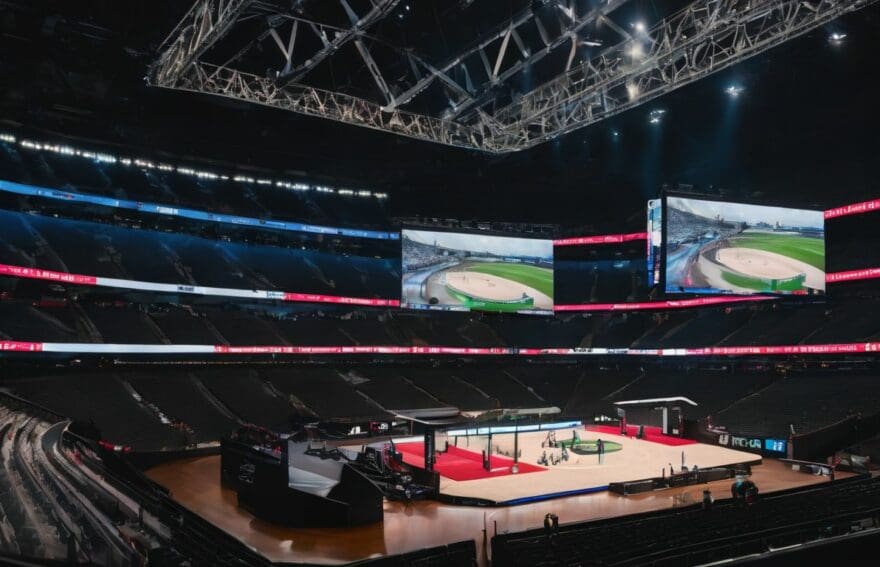The Impact of Esports on Traditional Sports Careers

Updated On: October 23, 2025 by James Connolly
Have you found yourself pondering the impact of the esports explosion on traditional sports careers? You’re certainly not alone; it’s a conversation that’s buzzing in clubhouses and living rooms alike.
With esports audiences now rivalling those of some top-tier sporting showdowns, it’s a phenomenon we simply can’t ignore. Our piece delves into this intriguing intersection of digital and physical realms, shedding light on what this seismic shift means for both athletes and avid gamers.
Continue reading as we peel back the layers of this development—our insights might just offer a fresh perspective on the evolving landscape of sports!
The Rise of Esports
Esports, also known as professional gaming or competitive video gaming, has experienced rapid growth and popularity in recent years. With the rise of digital sports and gaming tournaments, it has become a global phenomenon that attracts a large audience and offers lucrative opportunities for professional athletes.
Definition and overview
Esports, short for electronic sports, refers to the world of competitive gaming where players clash in virtual arenas. It’s not just about solo play; professional gaming often involves teams competing at high stakes tournaments with huge audiences watching live or online.
The video game industry has seen a surge in these events, offering a blend of strategy and skill akin to athletic competition.
These digital battles require intense mental abilities and often mirror traditional sports’ emphasis on teamwork and strategy. This burgeoning field is reshaping careers, creating ripples across sports technology and broadcasting sectors.
We’re witnessing an evolution as esports vies for attention amidst more conventional athletic pursuits, particularly amongst the youth engagement demographic of 18 to 34-year-olds.
Now let’s delve into how this rapid growth and popularity have come about.
Rapid growth and popularity
As esports continues to evolve and gain traction, its rapid growth and popularity are reshaping the landscape of traditional sports. The demographic of ages 18 to 34 is increasingly drawn to the world of esports, impacting viewership and engagement with traditional sports.
With the rise of sports video games in esports, there is a significant blurring between the two industries, challenging conventional ideas about athleticism and competition.
The growing popularity of esports among passionate gamers and novice gamers alike has sparked a new wave of interest in competitive gaming. Esports competitions are drawing massive online audiences and engaging young individuals who may not have previously been interested in traditional sports.
The Similarities Between Sports and Esports
Both sports and esports require teamwork, strategy, and skill to succeed. They also have dedicated fans and spectators who follow their favourite teams or players closely. These similarities highlight the potential for collaboration and mutual benefit between the two industries.
Teamwork
Esports and traditional sports both rely heavily on teamwork. In esports, effective communication and collaboration are essential for success in team-based games such as League of Legends or Counter-Strike.
Players need to work together to strategise, coordinate their movements, and execute plans efficiently. Similarly, traditional sports like football and basketball require teamwork where athletes must communicate effectively, anticipate each other’s actions, and work cohesively towards a common goal.
Teamwork in esports presents unique challenges due to the digital nature of the sport but emphasises similar principles of collaboration as seen in traditional sports. This shared emphasis on teamwork highlights how both industries promote valuable skills that can be beneficial across various career paths within the sports industry.
Strategy and skill
In esports, strategy and skill play a crucial role in determining success. Players must develop intricate game plans, make split-second decisions, and execute precise movements to outmanoeuvre their opponents.
The strategic elements of esports require careful analysis of the game environment and opponent’s actions, while skill encompasses a player’s ability to aim accurately, react swiftly, and maintain peak performance under pressure.
Both aspects are essential for excelling in competitive gaming and can be honed through dedicated practice and study.
Players often spend hours refining their strategies for different scenarios within the game, learning from past experiences and analysing gameplay footage to improve their decision-making skills.
Fans and spectatorship
Esports and traditional sports both rely on their fan base for support and revenue. Viewership is a crucial aspect of the success of both industries, with esports gaining popularity among younger audiences.
The rise of streaming platforms has made it easier for fans to engage with their favorite players and teams, creating a more interactive and immersive experience for spectators. Esports has also been successful in keeping viewer attention during sponsorship ads, leading to higher performance on brand metrics compared to traditional sports.
The dynamic nature of esports competitions, combined with innovative ways of engaging audiences, has led to increased interest from advertisers as well as the overall growth in fan bases.
Spectatorship plays an essential role in the economic impact of esports and traditional sports careers. With more young people turning to gaming as a form of entertainment, esports is successfully engaging new audiences at a rapid pace.
The Benefits of Esports on Traditional Sports Careers
Esports has opened up new opportunities in media and broadcasting for traditional sports careers, providing a platform for athletes to engage with fans in a digital space. Additionally, the transferable skills gained from esports can enhance traditional sports careers, leading to increased revenue and employment opportunities within the industry.
Opportunities in media and broadcasting
- Esports tournaments and events provide opportunities for individuals to pursue careers in sports broadcasting, with a growing demand for commentators, analysts, and hosts. These roles require strong communication skills and a deep knowledge of the game.
- As the viewership of esports continues to rise, there is an increasing need for production staff who can operate cameras, manage audio, and oversee live broadcasts. This presents exciting prospects for individuals interested in technical aspects of media production.
- Esports also offers opportunities for content creators to build a following through platforms such as Twitch and YouTube, providing engaging commentary, analysis, and entertainment related to their favourite games. This avenue allows for personal branding and entrepreneurial endeavours within the industry.
- Traditional sports organisations are recognising the value of esports media partnerships, presenting opportunities for professionals to bridge the gap between the two industries through collaborative content creation and cross-promotional strategies.
- The digital nature of esports allows broadcasters to experiment with innovative storytelling techniques, interactive graphics, and immersive experiences that engage audiences in new ways compared to traditional sports broadcasting.
- Individuals with skills in video editing, graphic design, and social media management have opportunities to work with esports teams or organisations to create captivating visual content for online platforms.
- With esports drawing younger demographics, there is an increasing need for broadcasters who can connect with this audience on digital platforms by understanding their preferences and consumption habits.
Transferable skills for traditional sports careers
Traditional sports careers offer a unique set of skills that can be transferred to various other professions. These skills include:
- Leadership: Athletes develop strong leadership qualities, which are essential for leading teams or managing projects in various industries.
- Communication: Effective communication is vital in traditional sports and is crucial for success in any career, fostering teamwork and collaboration across different roles.
- Resilience: Athletes are trained to overcome challenges and setbacks, a valuable trait applicable to any profession.
- Strategic Thinking: Athletes are adept at making split-second decisions and thinking strategically, skills that translate well into business and management roles.
- Time Management: The demanding schedules of athletes require exceptional time management skills, which are beneficial for meeting deadlines and prioritising tasks in any field.
- Adaptability: Adapting to changing game situations translates to adaptability in the workplace, a valuable asset when facing evolving market trends or industry changes.
- Problem-Solving Abilities: Athletes possess strong problem-solving abilities that can be applied to complex real-world situations in diverse professions.
Increased revenue and employment opportunities
Esports has opened up new revenue streams and job prospects within the sports industry. Brands are investing heavily in esports, leading to a surge in sponsorship deals, advertising, and merchandise sales.
Additionally, the growing popularity of competitive gaming has created demand for a wide range of roles, including professional gamers, coaches, analysts, event organisers, and content creators.
This expansion of career opportunities is reshaping the landscape of traditional sports careers and providing an alternative path for individuals passionate about gaming.
Moreover, as esports continues to capture a global audience across various platforms such as streaming services and live events, there is a significant increase in employment opportunities within media and broadcasting sectors.
The unique appeal of esports presents an avenue for aspiring professionals to venture into areas such as commentary, production management, and digital marketing strategies tailored specifically towards engaging with younger audiences.
Challenges and Integration of Traditional Sports into Esports
Traditional sports organisations may face resistance when integrating with esports, but there are ways for them to embrace and benefit from this growing industry. Read on to discover more about the impact of esports on traditional sports careers.
Resistance from traditional sports organisations
Traditional sports organisations have shown resistance to the growing influence of esports, viewing it as a direct competitor for audience attention and sponsorship revenue. Some traditional sports entities are slow to embrace the impact of gaming on their industry, often dismissing esports as lacking in physical prowess and athletic rigor.
This resistance creates a challenge for integration, limiting opportunities for collaboration and mutual benefit between the two sectors.
Esports is gaining ground with younger audiences compared to some traditional sports, offering an alternative form of competition and entertainment that appeals to a digital-savvy generation.
As the divide between these industries continues to blur, it becomes increasingly important for traditional sports organisations to adapt and find ways to coexist with the rising force of esports.
How traditional sports can embrace and benefit from esports
Traditional sports can benefit from embracing esports in numerous ways, such as:
- Leveraging the popularity of esports to attract younger audiences and engage with a demographic that may be less interested in traditional sports.
- Incorporating elements of esports, such as virtual reality training simulations, into traditional sports to enhance player development and performance.
- Collaborating with esports events and organisations to create cross – promotional opportunities that appeal to a broader range of fans and sponsors.
- Integrating esports broadcasting techniques and production technologies to enhance the viewing experience of traditional sports events, reaching wider audiences.
- Utilising the data analytics and performance tracking methods employed in esports to improve coaching strategies and athlete development in traditional sports.
- Investing in the development of crossover events or competitions that bring together athletes from both traditional sports and esports, fostering mutual respect and understanding among fans.
Conclusion
In conclusion, esports is reshaping the landscape of traditional sports careers. Opportunities in media and broadcasting are expanding, while transferable skills are creating new paths for athletes.
Despite challenges, the integration of traditional sports into esports presents a unique chance for growth and innovation within the sports industry. As both industries continue to intersect and influence each other, this evolution promises to create exciting prospects for future generations of aspiring athletes and gamers alike.
FAQs
1. How does esports impact traditional sports careers?
Esports have influenced career opportunities within the sports industry by creating new roles and competition for athlete careers in both areas.
2. Can someone involved in traditional sports easily switch to an esports career?
Individuals from traditional sports can explore career paths in the esports industry, often bringing valuable skills that are transferable to gaming-related jobs.
3. Does the rise of esports affect how young audiences view traditional sports?
Yes, there is a strong link between traditional sports and esports as both engage young audiences differently, with some preferring interactive gaming experiences offered by esports.
4. Has revenue from the esports industry surpassed that of certain traditional sports?
In some cases, yes; revenue impact of esports continues to grow significantly, sometimes surpassing earnings from selected conventional sporting events.
5. Are there any core differences between careers in esports vs those in traditional sports?
While there are similarities such as teamwork and competition, careers in Esports might focus more on technological proficiency whereas conventional sport careers typically emphasise physical skill and training.








